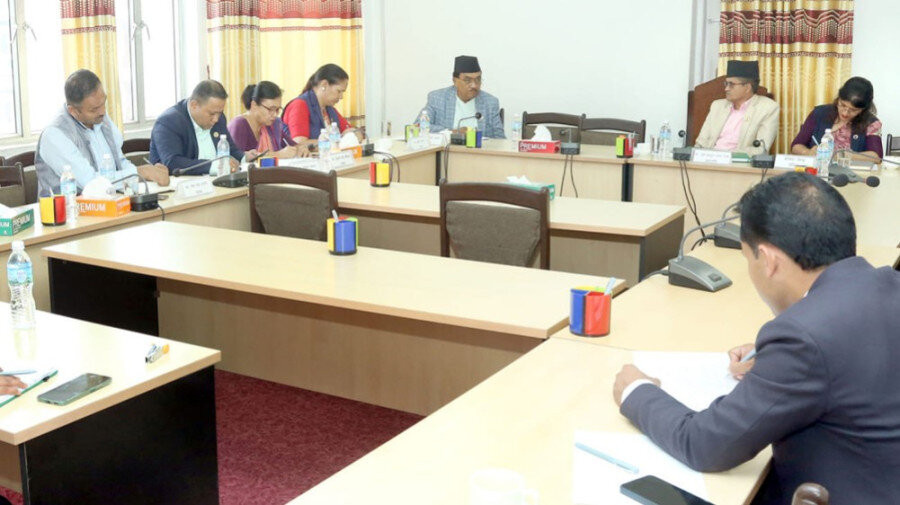National
House’s job done, state must now probe and sue, say experts
Senior Advocate Dinesh Tripathi urges impartial CIB probe now that Lamichhane is no longer home minister.
Binod Ghimire
The much-talked-about parliamentary special committee probing the cooperative scams submitted its report on Monday implicating several individuals including Rastriya Swatantra Party chairperson Rabi Lamichhane.
As per the Speaker’s ruling, the report will be forwarded to the KP Oli administration on Wednesday paving the way for its implementation.
After three and a half months of investigation, the CPN-UML lawmaker Surya Thapa-led team finalised the report, which includes several recommendations for reforming the cooperative sector and implicates individuals involved in embezzling billions of rupees from over three dozen credit cooperatives.
Along with Lamichhane, the then managing director of Gorkha Media Network, the committee has recommended that the government also prosecute chairman Gitendra Babu (GB) Rai; board member Kumar Ramtel; and initial founder Chhabi Lal Joshi for misuse of millions of rupees channelled to the media company from different cooperatives.
Officials at the Parliament Secretariat say the legislature is neither an investigating nor a prosecuting body. It can study matters of people’s concerns and recommend necessary actions to the government.
The seven-member committee led by Thapa was formed following demands from the Nepali Congress, the largest party, as victims of cooperative scams started hitting the streets demanding refund of their deposits.
“Now it is the government’s responsibility to make necessary investigations based on the recommendations from the special committee,” Laxmi Prasad Gautam, joint secretary overseeing the law department at the Parliament Secretariat, told the Post. “Prosecutions cannot be based solely on the House committee’s report. Cases can be filed only after detailed investigation by relevant government entities.”
Gautam, however, said the committee’s report can be presented as a supporting document while filing the chargesheet. On several occasions in the past, chargesheets have been filed by state agencies only after their own investigations based on recommendations from parliamentary committees.
In 2011, the parliamentary State Affairs Committee had recommended that the state entities investigate cases of corruption such as the procurement of armoured vehicles for the Nepal Police’s Sudan peacekeeping mission. Similarly, the Public Accounts Committee in 2019 had urged an investigation into the purchase of two wide-body planes for the Nepal Airlines after finding evidence of foul play.
After further investigation, the Commission for the Investigation of Abuse of Authority lodged cases related to these issues.
Rishi Ram Tiwari, spokesperson at the Ministry of Home Affairs, said the report should first be endorsed by the Cabinet, which will then assign various government agencies to implement its recommendations. “We will investigate the issues that fall under our jurisdiction,” he told the Post.
Legal experts say the parliamentary committee has done its job by investigating the problems facing the cooperative sector. Now, the government should start investigating and prosecuting the matter.
The report, with evidential backup, has implicated Lamichhane and others in misusing cooperative funds and presenting forged documents to gain shares in the media house, they say.
Dinesh Tripathi, a senior advocate, said various government agencies can now prosecute Lamichhane and others for the financial crimes they have committed.
“Criminal investigation can be launched against Lamichhane as per the Cooperatives Act and the Company Act. He can also be investigated for forgery, money laundering and organised crime,” he told the Post.
He suggested that the Central Investigation Bureau, which is investigating cooperative fraud, should be authorised to take the investigation forward on most issues, while the Department of Money Laundering Investigation can probe the money laundering concerns.
“The CIB couldn’t conduct the investigation earlier because Lamichhane, as home minister, influenced it. Now it can proceed fairly, with the report of the House committee as a reference,” said Tripathi.
While there is unanimity that Lamichhane can be booked for misappropriating funds at the Gorkha Media, some argue that the Thapa-led committee has not implicated him in the broader cooperative frauds.
“The report has pointed out the misappropriation of money that was funnelled from various credit cooperatives into the media company. While he can be prosecuted for this, the report does not link him to the cooperative frauds,” said Gandhi Pandit, a senior advocate, in an interaction on Tuesday.
The committee has concluded that Rs650 million from five credit cooperatives, including the Pokhara-based Surya Darshan Cooperative, Butwal-based Supreme Cooperatives, Chitwan-based Sahara Cooperatives, Birgunj-based Sano Paila Cooperatives, and Kathmandu-based Swarnalaxmi Cooperatives, was channelled to the Gorkha Media. However, it could not directly pin down Lamichhane’s involvement in diverting the cooperative funds to the media house.
In addition to recommending prosecution for those involved in the scams, the parliamentary committee has proposed that the government form a cooperative board to oversee the sector. A separate Act will be needed to establish such a board. “The committee has laid out several reformatory actions. The government now needs to formulate laws or enact different policies to implement them,” said Tripathi.




 10.12°C Kathmandu
10.12°C Kathmandu















